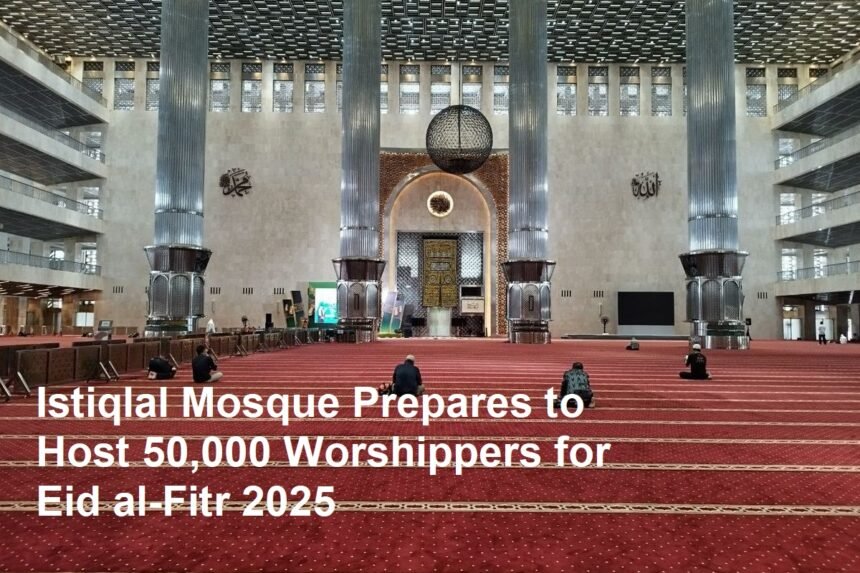Jakarta, Indonesia – In anticipation of Eid al-Fitr 2025, Indonesia’s iconic Istiqlal Mosque is undergoing extensive preparations to accommodate up to 50,000 worshippers for the festive prayers. As the largest mosque in Southeast Asia, Istiqlal’s annual Eid congregation is not only a spiritual highlight but also a logistical marvel, drawing Muslims from across Jakarta and beyond. With two years to go, mosque authorities, government agencies, and community groups are collaborating to ensure a safe, inclusive, and memorable celebration.
Key Details: Capacity and Coordination
Istiqlal Mosque, which spans 9.5 hectares in Central Jakarta, typically hosts around 200,000 worshippers annually for daily prayers and major Islamic events. However, Eid al-Fitr—the festival marking the end of Ramadan—is its busiest occasion. For 2025, organizers aim to optimize space by expanding prayer areas into courtyards, nearby streets, and collaborating with the National Monument (Monas) park to manage overflow. Advanced registration systems and timed entry slots will be introduced to streamline crowds.
“Eid at Istiqlal is a cherished tradition for many families,” said H. Asep Saefuddin, head of the mosque’s management committee. “Our goal is to balance accessibility with safety, ensuring everyone can perform their prayers comfortably.”
Infrastructure Upgrades
To meet the 50,000-worshipper target, the mosque is implementing several upgrades:
- Expanded Prayer Halls: Temporary canopies and flooring will extend the main prayer area into the courtyard, doubling capacity.
- Improved Facilities: Additional restrooms, ablution stations, and drinking water points are being installed.
- Digital Guidance: LED screens and a mobile app will provide real-time updates on prayer times, entry gates, and crowd density.
- Parking and Transportation: Partnerships with TransJakarta and the city’s MRT system will offer free shuttle services, while nearby government buildings will open their parking lots.
Jakarta Governor, Heru Budi Hartono, emphasized the city’s support: “Istiqlal is a national treasure. We’re committed to ensuring infrastructure upgrades align with Jakarta’s vision for sustainable urban mobility.”
Security and Health Protocols
With large crowds come significant safety challenges. Authorities are coordinating with the Indonesian National Police (Polri) to deploy 1,000 officers for crowd control, bag checks, and traffic management. Health protocols, including on-site medical tents and emergency response teams, will address potential issues like heat exhaustion—a common concern during Indonesia’s tropical Eid season.
Post-pandemic measures, such as optional mask distribution and sanitation stations, will remain in place. “We’ve learned from past events,” said Dr. Rina Susanto, a public health advisor. “Preparedness is key to preventing incidents.”
Religious organizations, including Nahdlatul Ulama and Muhammadiyah, will assist in guiding worshippers and promoting communal harmony.
Cultural and National Significance
Opened in 1978, Istiqlal Mosque—whose name means “Independence”—was built to symbolize Indonesia’s sovereignty and religious diversity. Designed by Christian architect Friedrich Silaban, its minimalist modern style incorporates elements of Javanese and Islamic architecture, reflecting the nation’s multicultural ethos.
Eid prayers at Istiqlal also highlight Indonesia’s tradition of tolerance. For decades, the mosque has collaborated with Jakarta’s nearby Catholic cathedral to manage traffic and crowds during major holidays. “Istiqlal isn’t just a mosque; it’s a symbol of unity,” said Siti Nur Azizah, a interfaith activist. “Seeing thousands pray here, side by side, reminds us of our shared humanity.”
Community Engagement and Charity Initiatives
Beyond prayers, Eid at Istiqlal is a time for charity. The mosque’s management plans to distribute 10,000 meal packages and clothing to low-income families ahead of the festivities. A blood donation drive and free health screenings will also be held in the days leading up to Eid.
Local volunteers, including students and youth groups, are central to these efforts. “Volunteering here during Eid has taught me the value of service,” said Adi Pratama, a university student. “It’s about giving back to the community.”
A Symbol of Unity in a Diverse Nation
As Indonesia—home to the world’s largest Muslim population—prepares for Eid 2025, Istiqlal Mosque stands as a beacon of faith and togetherness. Its preparations underscore the nation’s ability to blend tradition with modernity, spirituality with practicality.
“Eid at Istiqlal is more than a prayer; it’s a celebration of our identity,” said KH. Yahya Cholil Staquf, Chairman of the Indonesian Ulema Council (MUI). “In these challenging times, such gatherings remind us of the power of unity and gratitude.”
With meticulous planning and community spirit, Istiqlal Mosque is poised to welcome 50,000 faithful in 2025, reinforcing its role as a cornerstone of Indonesia’s cultural and religious landscape.












